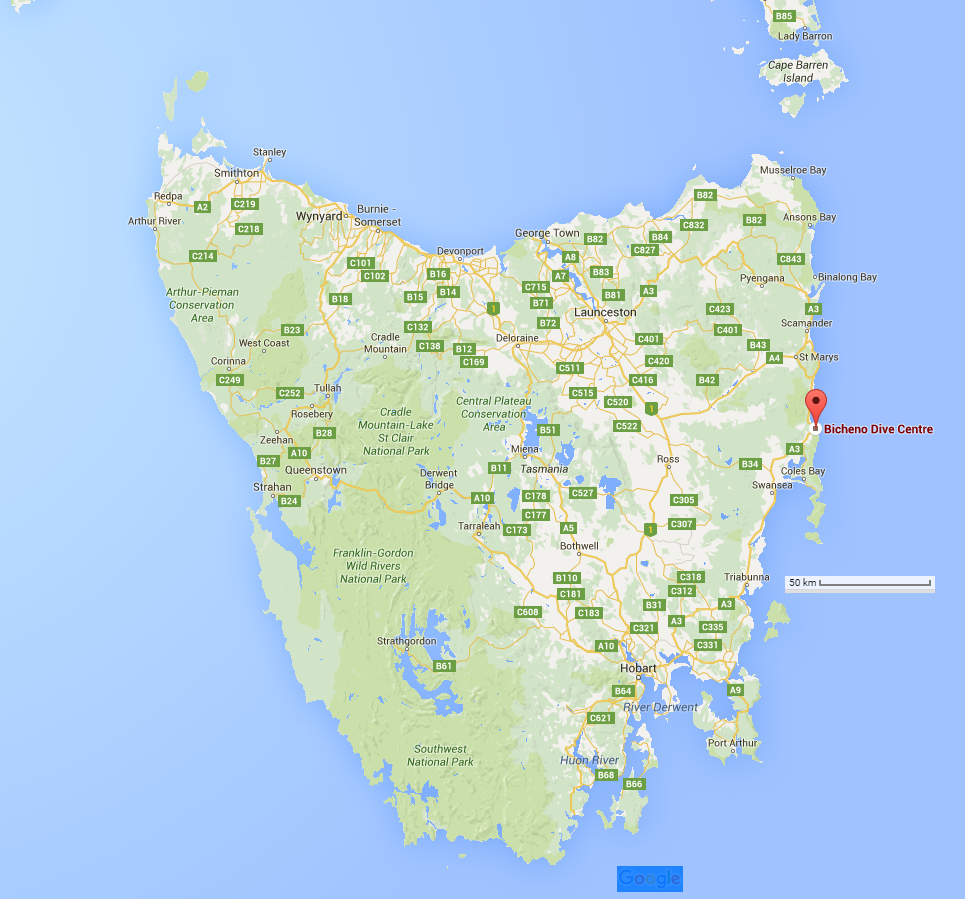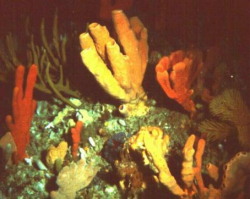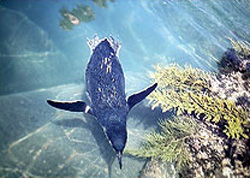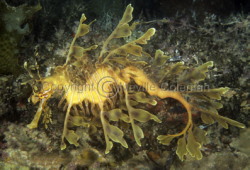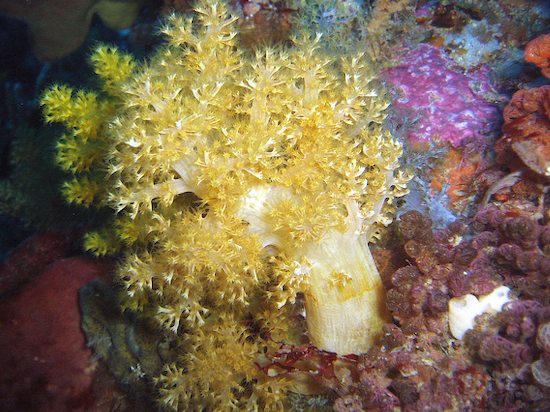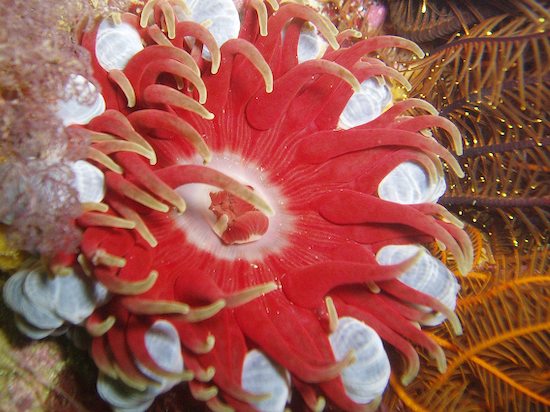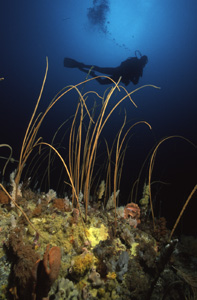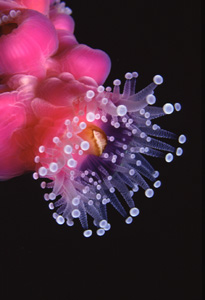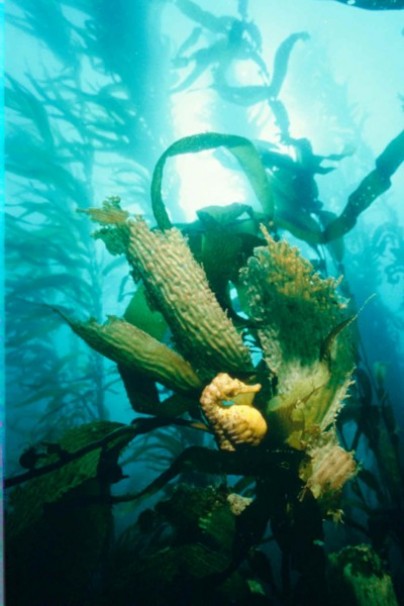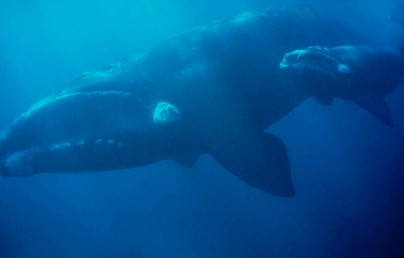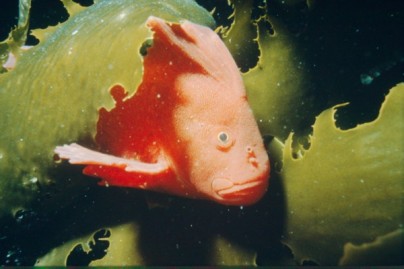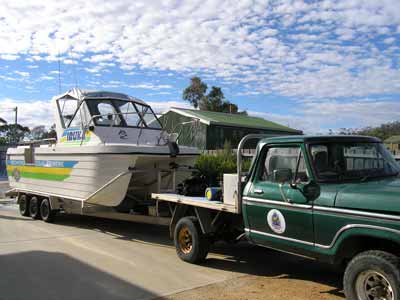SELECTED DIVING IN TASMANIA - BICHENO
Note: much of the information on this page is from and Copyright of, Bicheno Dive Centre.
BICHENO is classified as one of the best temperate water dive locations in the world, it is a gateway to a spectacular underwater paradise, offering the best picturesque diving you will ever experience.
Click the map below to go to the Bicheno Dive Centre website.
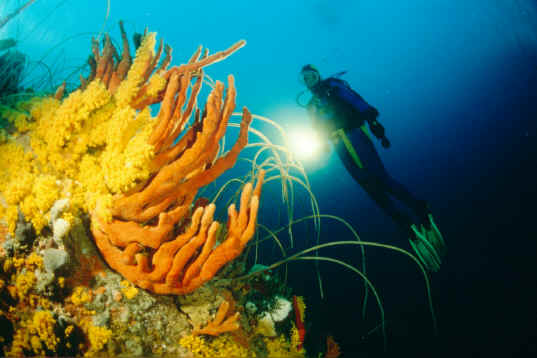
Bicheno Dive Centre offers diving trips around Bicheno with guides for qualified divers in Tasmania.
You can experience the superb diving waters off Bicheno, said to be one of the most exciting locations for undersea diving in Australia. You will explore magnificent sponge gardens and spectacular kelp forests. Most sites are within the Governors Island Marine Reserve, protected for its diverse underwater life. You may even spot whales and dolphins in the area during winter and early spring. The Bicheno Dive Centre dive tours cater for all qualified divers, from novices to the very experienced. All diving equipment is available for hire.
In winter when diving is best, with water visibility reaching 30 metres and more, you may have the pleasure of diving amongst schools of dolphins or to swim alongside the whales who use Bicheno as a stopover during their migration.
DIVE SITES
GOLDEN BOMMIES: This dive is one of the most popular of the deeper dives as you come round paradise reef or drop directly onto them. You are greeted by two very large bommies both covered with yellow zoanthids, giving them their golden appearance. Both bommies have a covering of sea whips; many of these whips have a thick mass of jewelled anemone covering them. There are also quite a number of finger sponges on this dive, and usually large schools of butterfly perch as well as boarfish, morwong, trumpeter and cowfish. Depth 33-38 m
HEDGE HOG: Hedge hog is a very nice dive around two boulders; one large and one small. The smaller one depicts a head, the larger like a body, and with the larger rock covered with sea whips, the two together have the "appearance" of a huge hedge hog. This dive is one of the deeper dives, and on the outer edge of the rose garden. Depth 33-38 m
PARADISE REEF: The western side of paradise is covered with sea whips and is on the way to the golden bommies. It is a very pretty dive. The eastern side of paradise, has a lot more finger sponges than the western. Both sides drop away to sand edges, and are well worth a dive in their own right. Depth 30-38 m
MR WHIPPY: As the name suggests, the whole boulder is covered with sea whips, a number of them covered with jewelled anemone, some as thick as baseball bats. The area also has some large finger sponges, some covered with basket stars. This is a very pretty dive and you usually encounter schools of butterfly perch, boarfish, banded morwong, old wives, trumpeter and gurnards. Depth 33-36 m
MAGIC GARDEN: One of two deeper dives off Cape Lodi. The top of the reef comes to within 5 m of the surface, and drops into a gully covered in sea whips and sponges. As you come toward the end of the gully, a right turn takes you to a very nice undercut full of sponges and sea whips. This leads you to a small cave, and when re-emerging from this cave, it's like magically entering a new dive with masses of sea whips and huge boulders forming small swim thru's. A very pretty dive. Depth 33-36 m
HAIRY WALL: The hairy wall is a dive along a sea whip covered wall with outcrops of sponges. A very colourful dive with a number of small gullies to explore. On the way, the dive finishes at one of the larger gullies where you can slowly ascend to your safety stop while looking for picnogonids or nudibranchs. Depth 30-36 m
TRAP REEF: Trap reef is on the northern entry to the gulch. The reef comes to about two metres from the surface; the dive begins on top of the reef, and drops down a kelpie gully to a series of broken boulders. There are a number of large finger sponges, and all the rocks are covered with yellow zoanthids and sea whips. Depth 30-33 m
EASTER ROCK: Easter rock is in Governors Island marine reserve, and is a large boulder covered on one side with sea whips, and the other with finger sponges. The surrounding area is broken boulders also with finger sponges and sea whips. There is also a large area of the rock that is covered with jewelled anemone and yellow zoanthids. Depth 30-33 m
ROSE GARDEN: The Rose garden runs from the Canyon to Mr whippy, and is a mass of broken boulders covered with sponges, sea whips, yellow zoanthids and jewelled anemones. There are also many finger sponges. In this, runs out towards the Rose garden, then cuts across to Paradise reef and back to the Hairy wall area, some with basket stars attached. Depth 30-33 m
STEPS: As you drop to the kelp, you can see the formation step down like a staircase to the sand and broken boulders. This dive has sea whip covered rocks, finger sponges, and sponges, and as you come to the halfway point, there is a zoanthid and sponge covered wall that runs into a small cave system in 20 m. A nice fun spot to end the dive before you ascend up the kelp for your safety stop. Depth 30-33 m
CANYON: A really nice dive with a bit of everything from walls to broken boulders. This dive starts in about 15 m, and drops over part of the Hairy wall and runs along the Rose garden where you turn across to Paradise reef, head back to the Hairy wall up to a ledge full of lobster. It's then up to Mt Everest for a safety stop. A very pretty dive. Depth 30m
DOWN TOWNER: A pretty dive with lots of sponges and small sand filled grottos. Normally schools of butterfly perch can be seen as you look toward the surface. Depth 30 m
GUINEA PIG: Sitting off Cape Lodi, the reef appears out of nowhere, and is just a few metres under the water. This big circular reef is normally teeming with fish life, and has some small swim thru's which are encrusted with sponges and sea ships. Also a site where you can see large pumpkin sponges. Depth 30 m
THE CASTLE: The Castle starts with a really nice undercut, with masses of sea whips and sponges, and is usually inhabited by a large school of boarfish. As you swim along the wall, you come to the entrance of a 30 m long tunnel; the end is visible but quite dark inside, and is home to a large number of lobster. Towards the end of the tunnel, you come back to daylight and continue along the wall to another very nice undercut and up to Mt Everest for a safety stop. There are two alternates to end this dive. Depth 25-30 m
BIRD ROCK: One of the nicest spots in 20 m. It has three main areas; the "t" cave, the elbow and the ball room. The t cave is an area that has very pretty walls covered in jewelled anemones and yellow zoanthids. Also keep an eye out for picnogonids and nudibranchs. Conger eels sometimes take up residence here. The elbow has walls that are a mass of different coloured jewelled anemones. From here, you can see the ballroom; a 1 m high cave that has a ceiling with masses of jewelled anemones and yellow zoanthids. The floor has a carpet of sponges. This area usually has a large number of varieties of fish. Depth 20
CANUCK: Start this dive in a small cave, then move along the side of the reef looking for nudibranchs and picnogonids. As you get to the 20 m area, there is a really nice sponge garden. At this point, turn around and head towards a large boulder; lots of anemones and sponges. Head up the gutter to another large rock; look for biscuit stars on the walls. Good dive for watching lobster. Head back to the start point and slowly up the reef. Depth 20 m
SPLIT ROCK: Split rock is a dive that we normally do as a figure of eight around two large boulders. This is a dive that is done slowly so you don't "miss out" on the smaller things. There is a really nice undercut on the outer boulder, with a nice patch of sea whips and some nice sponges. Look up into the zoanthids on the ceiling; there are sometimes small lobster hiding there. The inner boulder has a small cave (too small to swim into) but has some really nice sponges and anemones. A nice relaxing dive. Depth 20 m
27B: Located at the top end of Governors Island, this dive covers three very large boulders. Look at the walls for nudibranchs, picnogonids, small sponges and anemones.There are also some large undercuts, normally bustling with lobster. The undercut on the lower rock is covered with sponge and sea whips. There are usually lots of boar fish, wrasse, banded morwong and butterfly perch. The dive ends at the shallowest of the three rocks where you swim through a small cave and come out into a small grotto and up to the top of the reef. Depth 20 m
MUIRS: Muirs is a lovely dive located south of the blowhole. The reef is formed by a group of very large rocks in a circle forming an area like a small amphitheatre. Most of the rocks are leaning against each other, forming small swim thru's between two and three metres long. They are great fun in a swell (It's like being shot out of a cannon!). There is also a sloping wall at the southern end of the reef which is covered in yellow zoanthids and jewelled anemones. A really nice relaxing dive. Depth 16 m
SHORE DIVES
- There are a number of shore dives in the area;
- The rock
- Cray tubes
- Blue waters
- Souvenir shells
- Suntrap
- Rice pebble
